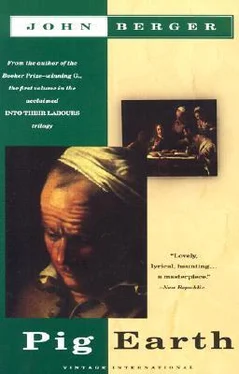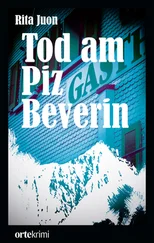Thank you, he said when at last she had bound the wound up again. You have very gentle hands.
Laid out on the grass, his body looked long and his bare legs as thin as those of the body on the cross.
Gentle! she said. They’ve worked too hard to be gentle. They’ve been in too much shit.
He shut his eyes.
How old are you? she asked.
Nineteen.
Is your mother alive?
I believe so.
And your father?
He is a judge.
You have such regular teeth. You don’t come from here.
No, from Paris.
Have you ever turned hay?
I will do as you do.
She helped him to his feet. After a while, he stopped to wipe his face with the corner of his shirt.
She held out a bottle to him. However much you drink when haymaking, she said, you never piss!
At midday a car drew up at the farmhouse.
Take no notice, ordered the peasant from the Dranse, go on working.
Two men in uniform got out of the car.
They’re not the Milice, said Edmond, they’re Germans.
The Cocadrille, who was standing beside the young man from Paris, suddenly reached up and slapped the side of his neck with her open hand.
What! he shouted.
A horsefly had been about to bite him.
Soon they could hear the heavy breathing of the Germans whom the slope still hid from view. The first to appear was an officer with a tight belt and straight high cap, pulled down over his eyes. Following him came a sergeant holding a submachine-gun.
Everyone here! shouted the officer. He surveyed the five haymakers: four peasants and one dwarf woman.
We are looking for six assassins. We know who they are. Who has come by here this morning?
I’ll tell you, said the Cocadrille. The brain needs renewing. It wanders. If I had the money to buy a new one and if they sold them, I’d change it tomorrow. She buttoned her dress where it was undone. I did see a car go by this morning — or was it yesterday morning? An army could go by and I wouldn’t be sure. When I saw this car I said to myself, that’s strange. There was an officer driving it, with a cap like yours, sir — she pointed the prongs of her wooden fork at the officer’s face: the sergeant pushed her back. I said to myself, he looks like a man wearing a disguise. Perhaps he was one of the men you are looking for, sir, one of the assassins. His cap came right down over his face like yours, sir, as if he was trying to hide his face. Was it this morning or yesterday morning I saw this car? He could have stolen the car, you see, sir. Was it yesterday? I wish I knew. She put a finger in her ear. You’ll do better, believe me, sir, asking my two cousins here. She pointed her fork at the maquisards.
Nobody’s passed this way, said the peasant from the Dranse. Not since before it was light. We were up at five. Nobody has come by, unless they stuck to the forest and we didn’t see them.
The peasant from the Dranse stared vacantly at the distant snow-covered mountain, white like a pillow propped against the blue sky, and farted.
The officer approached Edmond and gently touched his face so that he could look into the boy’s eyes.
They couldn’t come here, said Edmond ingratiatingly, they know too well where our sympathies lie.
No, the officer said, you all hate us!
And you? demanded the sergeant, pointing his gun at the young Parisian.
The hay is dry now. He spoke slowly and stupidly as if he were the dwarf woman’s son.
What have you seen this morning?
Flies and horseflies.
Has anyone come down from the forest?
Flies and horseflies.
His idiocy provoked the sergeant to jab the muzzle of his gun hard into his stomach. The dwarf woman raised her fork in protest. The officer scowled at the prospect of a brawl on the steep slope which the hay made slippery.
We are wasting our time, he said curtly to the sergeant. To the peasants he said: If you are lying, I can promise you we’ll be back, just as we came back to T …
The previous winter the Germans had come one night to the village of T … with two armoured lorries, an officer’s car and a searchlight mounted on a sidecar. With their searchlight trained on the doors, they went from house to house. The women they chased into the forest. The men they lined up and shot. Whilst the stables and animals were burning, the German troops sang.
The sergeant left first. The officer, as he went down, dug his heels in so as not to slip, and the dust from the hay coated the backs of his polished boots.
After the car had driven away, there was nowhere any sign of what had happened or of what might happen.
The Aunt here made a fine speech! said the peasant from the Dranse. She scowled in case he was taking her for a fool. During her first life the Cocadrille was never indifferent to what people thought of her.
It’s safe now. They won’t come back until they’ve questioned everybody, she said to the one she had bandaged. You can go and rest in the hayloft.
He must work, Henri contradicted, that was the understanding from the beginning. If they come back and find him …
His leg needs rest.
Jésus! It’s not your farm they’ll burn down.
You can lie in the hayloft, and if they come back you can be working on top of the hay, the Cocadrille said.
And if he’s asleep?
I’ll stay with him.
Stay with him! In God’s name! We have this hay to get in.
The Aunt is right, said the peasant from the Dranse, you should listen to her.
Half the hayloft was empty; in the other half the new hay was stacked almost as high as the roof beams. When she shut the door it was like twilight. She told the wounded man, who was young enough to be her son, on no account to hide in the hay, for the previous year a maquisard hiding in another farm had buried himself in the hay and the Italian soldiers had searched the loft, sticking in pitchforks. One of the prongs had wounded him in the neck. He dared not cry out. The Italian soldiers dawdled in the barn, joking with the peasant’s wife. And the wounded man bled to death in the blood-red hay.
They know they are defeated now. Couldn’t you see it in the officer’s eyes? said the young man.
The Cocadrille shrugged her shoulders.
What will you do when the war stops?
I will continue my studies, he said.
And one day become a judge like your father?
No, it is another kind of justice that I believe in, a popular justice, a justice for peasants like you and for workers, a justice which gives factories to those who work in them, and the land to those who cultivate it. As he said this, he smiled shyly, as if confessing something intimate.
Is your father rich? she asked.
Fairly.
Won’t you inherit some of his money?
All of it when he dies.
There’s the difference between us.
She had a habit of kicking off one sabot and rubbing the bare foot against her other leg.
I shall use that money to start a paper. By then we shall have a free press. A free press is a prerequisite for the full mobilisation of the masses.
Are your feet hot too? she asked.
The hay is dusty, he said. He gravely gave everything he said equal thought.
Meanwhile you are in danger, she commented.
Not more than you.
That is true, today we are equal.
Do your brothers think like you?
I don’t think.
I didn’t trust them, he said.
They are as straight as a goat’s hind leg. You must rest now. Later I will dress your wound again. What is your first name?
They call me Saint-Just.
I have never heard that name. Rest now, Saint-Just.
He slept without stirring. In the evening whilst the others were eating, she took him bread and a plate of soup.
I feel stronger, he announced.
I can dress your wound again.
Читать дальше












